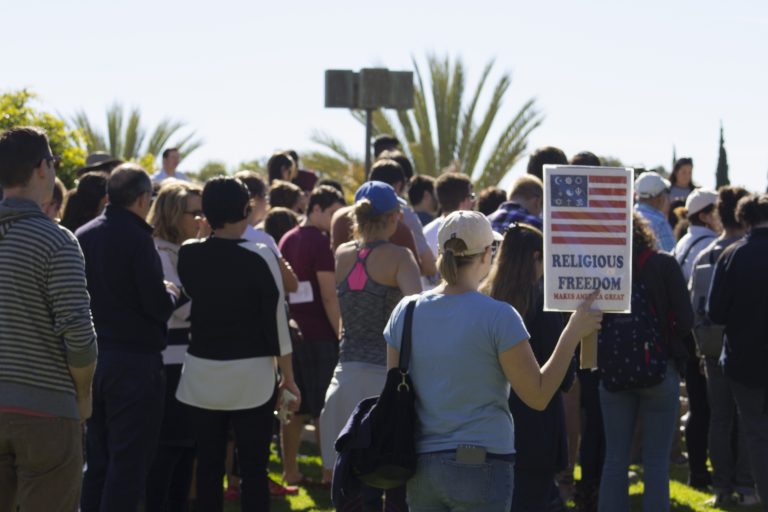
Gwendolyn Wu
Executive Content Editor
Chanting slogans like “No hate, no fear, refugees are welcome here,” hundreds of University of California, Santa Barbara students rallied against President Donald Trump’s travel ban on Monday.
Approximately 300 students joined an hour-long march at noon from Storke Tower to Isla Vista and back, organized by third year anthropology student Naia Al-Anbar, the Muslim Student Association, and Student Activist Network. Muslim students and various professors gave speeches on the power of immigration and why Trump should not place travel restrictions on refugees.
Al-Anbar was the chief organizer of the march. After the order was announced Saturday, Al-Anbar mobilized to support other Muslim students affected. Immigrants and refugees have already gone through stringent screening processes to get into the United States and they pay taxes, so they have “other things to do,” she said.
“I find the irony behind their position to be both hilarious and tragic, because their opinions will forever pit people like me as un-human and not worth it,” Al-Anbar told The Bottom Line in reference to claims that a majority of Muslim immigrants support terrorism.
To terrorism and immigration experts in the country, the ban is still fuzzy.
Other UC students have gotten involved in the efforts to help people affected by the travel ban. At UC San Diego, students and faculty also protested. Over the weekend, UC Davis student Sara Ehsani-Nia translated for detainees at San Francisco International Airport.
However, some UC students are stuck abroad. An unidentified Iranian-Canadian citizen posted on the UCSB subreddit on Saturday asking for help contacting the university. The student is currently in Germany, trying to travel back to the U.S., and expressed concern over missing exams.
On Tuesday, The Bottom Line spoke with Navid Yousefian, a Ph.D student in the political science department on campus. Yousefian was named as one of the students stuck abroad by organizers of the march, but is currently on a leave of absence from the university.
“[I] was planning to go back to school in summer, not sure that would be an option anymore though,” Yousefian wrote in a Facebook message. “I’m done with my PhD [sic] courses but I need to get back to take the comprehensive exam and also defend my prospectus.”
Yousefian said that he hopes that there will be a way for him to complete his degree, and that his department is working to figure out a solution to his problem.
The university is not allowed to comment on how specific students are affected by the ban, according to Andrea Estrada, a spokeswoman from the Office of Public Affairs. UC fall 2016 census data shows that three undergraduate students attending UCSB are international students from Iran and Syria.
UC President Janet Napolitano, along with all chancellors in the UC system, signed a statement expressing their worries about the executive order on Sunday. The UC Office of the President called it “contrary” to the system’s values.
“The UC community, like universities across the country, has long been deeply enriched by students, faculty, and scholars from around the world, including the affected countries, coming to study, teach, and research,” the statement said. “It is critical that the United States continues to welcome the best students, scholars, scientists, and engineers of all backgrounds and nationalities.”
On Saturday, the UC issued a statement asking visa-holders and permanent residents affected by the travel ban to avoid traveling out of the United States. On Monday, UCSB’s Associated Students executives followed with a similar statement.
“As an executive team we encourage such student actions and lend our office’s support for future events,” they said in regards to Monday’s protest. “Our immediate concern is to identify any student, faculty or staff whose travel back to the United States is affected.”
The Office of International Students & Scholars has also received reports of students from around California stuck abroad during this time.
“Some students were sent to secondary inspection where they were scrutinized about the details of their records,” director Simran Singh said of students that had been traveling at the time in a statement. “Eventually everyone was admitted through the border except for a few who had records that violated status such as terminations of the I-20 or DS-2019.”
As the ban takes shape over the coming days, students are watching to see how they and their loved ones may be affected.
“I think that the work that we do and that other people are committed to doing this is so important,” Al-Anbar said, “because we need people who are willing to step in and say no, you’re actually a person and that’s a thing you can always rely on—that everyone will always think you’re a person, in some way, shape, or form.”
Madeleine Lee contributed to this article.
This article has been updated.










